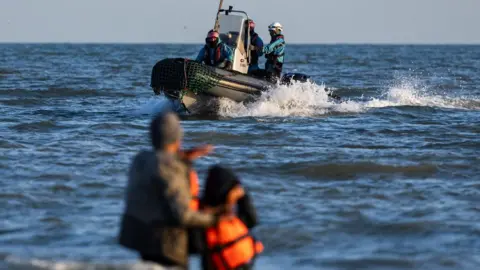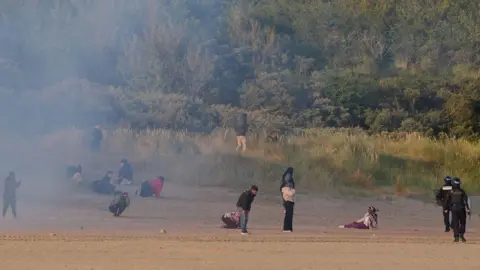Starmer says he favours more 'transactional' approach to granting visas
 Getty Images
Getty ImagesThe UK prime minister has said he is considering whether British visas could be issued based on how well countries co-operate with the UK on issues such as taking back failed asylum seekers.
Sir Keir Starmer told reporters he favours a "much more transactional" approach to the issue, as the government admits the situation in the English Channel is "deteriorating."
Meeting on the side-lines of the G7 summit in Canada, Sir Keir and the French President Emmanuel Macron agreed to "work closely" to tackle crossings, a No 10 spokesman said.
Downing Street added both leaders agreed that migration should be a key focus of their meetings during the president's state visit to the UK in July.
Official figures show more than 1,500 migrants crossed the Channel in small boats last week, pushing the total for the year to just over 16,000 – 42% higher than at the same point last year.
"It is a serious challenge that requires serious responses to it," Sir Keir told reporters at the summit in Kananaskis in the Canadian Rockies.
"We are looking at issues like a smarter use of our visas, looking at whether we should tie our visas to the work that the countries we're dealing with are doing on preventative measures and on return agreements," he said.
He said he was looking at what the government could do on returns agreements of illegal migrants with other countries.
"We have done a number of bilateral returns agreements. So the question is, again, whether it is possible to go a bit beyond that.
"We are including looking at this question of visas now and whether we can't be a bit smarter with the use of our visas in relation to countries that don't have a returns agreement with us."
He added this would be more "transactional" as an approach.
"But you know, do we need to do more?" he said.
"Yes, we do, and it's by working together that I think we can achieve that. But it was a central part of my discussion, certainly with France, with Germany and with Italy."
Ministers have been pushing for the French government to implement new rules to make it easier to intercept boats.
In 2023, the previous Conservative government struck a deal to give France almost £500m over three years to go towards extra officers to help stop migrants making the journey.
Official figures show French authorities have intercepted fewer than 58% of recorded boat crossings this year.
In March, Home Secretary Yvette Cooper said the French government was reviewing its policies to tighten up policing around small boats, and recent days have seen a more aggressive posture from French police.
The BBC understands the French authorities will be introducing a new "maritime doctrine" from the beginning of July, to allow special squads to intercept migrant dinghies up to 300m from shore.
The change in tactic is expected to be unveiled at the UK-France Summit on 8 July.
Home Office sources have described the change in tactics as a potential "game changer".
Government sources also say there is intelligence to suggest a recent uptick of violence in the migrant camps close to Calais may be down to a shortage of dinghies.
It comes as French authorities reported smugglers are changing tactics to launch so-called "taxi boats" from new sites and with greater speed.
Instead of inflating their boats in the dunes along the coast, close to police patrols, the gangs are launching them from better hidden locations, before picking up paying customers who wait in the sea, out of reach of the police.
The BBC has seen police body-cam footage showing people hurling rocks at officers and even holding a young child in front of the police to try to stop them, while one woman said police use tear gas on the crowds.
Conservative shadow home secretary Chris Philp said "the Channel crisis is spiralling out of control" under Sir Keir's watch.
"The gangs are laughing, the boats keep coming, and Labour's response is to form another taskforce and hold a summit. It's weak and it's embarrassing," he added.
 PA Media
PA MediaLabour campaigned on a promise to "smash the criminal boat gangs" bringing migrants to the UK, and the Sir Keir has made tackling illegal immigration and "restoring order" to the asylum system a priority for the government.
After coming to government, Labour immediately scrapped the Conservative government's plan to deport asylum seekers to Rwanda, redirecting funds to enhanced border security initiatives.
But Channel crossings have hit 40,000 since Labour took office in July 2024 - a 21% increase on the same period the year before.
Over the same period, 940 boats have been intercepted - stopping nearly 28,000 migrants from reaching the UK.
The government has pointed to good weather and the willingness of people smugglers to cram more people onto small boats as factors driving the spike in migration crossings.
It has prompted the Conservatives to accuse ministers of "blaming the weather" for the rise in numbers.
Additional reporting by Sam Francis

Sign up for our Politics Essential newsletter to keep up with the inner workings of Westminster and beyond.
